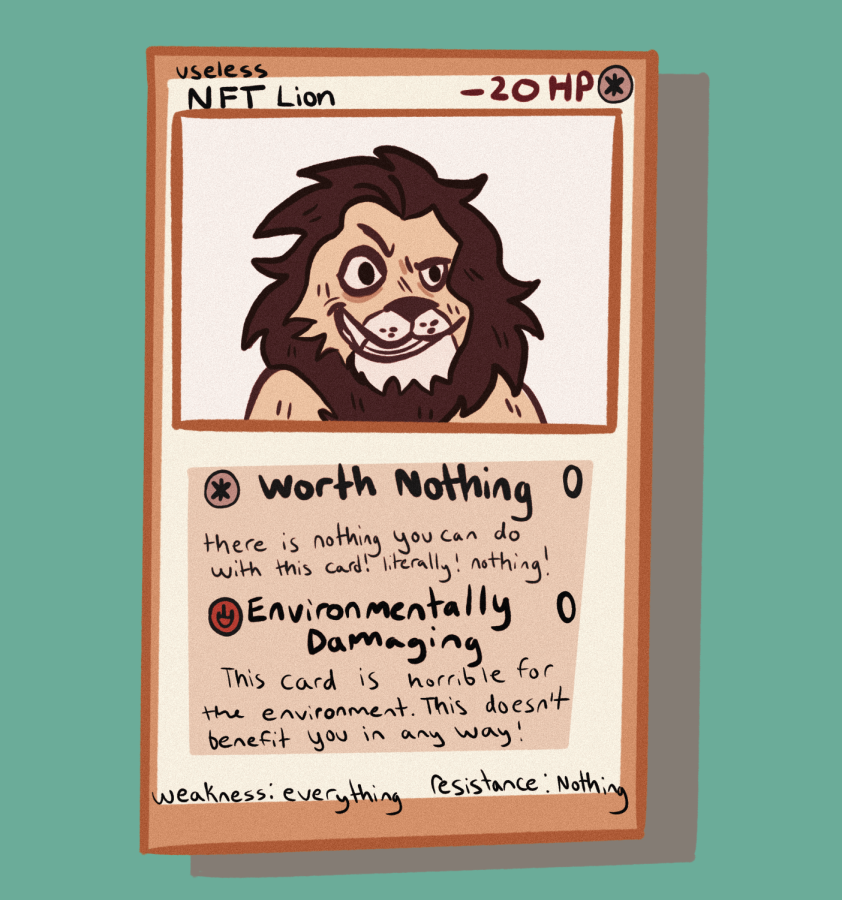Opinion | NFTs are overpriced trading cards
December 9, 2021
Imagine you had a one-of-a-kind Pokémon card. Now make it digital — this is an NFT. NFT stands for non-fungible token — typically digital artwork — and is part of a cryptocurrency blockchain: NFTs are paid for with cryptocurrencies like Bitcoin and Ethereum and different cryptocurrencies use separate blockchains. Moreover, a blockchain is a digital system to record information that is nearly impossible to change.
However, this online economic system creates a lot of nuisances for NFTs and generates a debate over their worth or lack thereof.
An immediate nuance from NFTs is that they can be easily downloaded without paying for them. Since NFTs are digital links to an image, anyone may view them before they are sold for an overpriced amount (tens to hundreds of thousands of dollars) or click “save image as” to have this piece for free. The only thing these viewers lack is the unique link leading to the image.
One person who took this to an extreme was Geoffrey Huntley who “went on an NFT heist and downloaded 20TB of NFTs.” Huntley showed NFT art is nothing more than an image link. Additionally, this revealed that hosting sites selling NFT artwork do not store the NFT on a blockchain but rather host it on the web — meaning anyone who knows how to save an image can possess an NFT.
Due to NFTs also being unregulated, the tokens produce opportunities for money laundering. For instance, someone can illegally spend $1 million or so on their NFT, flip it onto the market and sell it for a higher price and profit.
Get The Daily Illini in your inbox!
The current issue is that because art is subjective, NFTs do not face examination from lawmakers. One might ask if blockchains are systems that record information impossible to change, how are people able to launder and avoid capture. The answer is that utilizing cryptocurrencies already adds a layer of complexity and ambiguity to these transactions. On top of that, converting illegal funds to cryptocurrencies, then transferring through numerous transactions, makes tracing the illegal funds difficult.
Despite money laundering through NFTs being a problem, more pressing questions arise: Are NFTs here to stay and are they worth investing in?
Since this technology is new, people who want to learn more about NFTs are curious as to whether they should invest or if this is a fad. At this point, most Americans believe NFTs are good and safe investments. According to a Pipslay poll which included “more than 30,000 Americans, 48% said NFTs are a good investment.” To some, 48% is a surprising amount and compels one to consider the NFT market. Nonetheless, these results originate from the media repetitively preaching the wealth of NFT sales enough that people believe they understand how it works.
Others might argue NFTs are here to stay as they are digital and nothing is deleted from the internet. But when contemplating the digital aspect, one would realize due to continuous tech advancements, occasionally files will become degraded or corrupted, making these NFT images virtual junk in the future.
NFTs are the latest trend, and the market can go anywhere and other major corporations are trying to jump onto this bandwagon. After noticing big profits cannot always be obtained, NFTs are doomed to become a fad.
Are NFTs worth investing in? That depends on the individual. If an individual can withstand purchasing the equivalent of an overpriced, discontinued Pokémon card, then investing is a great option. If investing, prepare for trouble and make it double.
Aditya is a junior in GIES.







